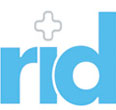
April 22, 2009
Dear Friends of RID,
Thanks to your help, we are launching new initiatives to make a hospital stay cleaner and safer.
Looking Ahead: Beyond Hand Hygiene
Hand hygiene is critically important in preventing hospital-acquired infections. But there's been almost too much emphasis on getting doctors and nurses to clean their hands, and not enough attention on training them to keep their hands from becoming recontaminated before they reach the patient.
Stand in an emergency room and watch the most well-intentioned doctor and nurse clean their hands, glove, and then reach up and pull open the privacy curtain to see the patient. That curtain is seldom laundered and is laden with bacteria. So, immediately, the caregiver's hands are re-contaminated.
Once doctors and nurses touch any surface, their hands or gloves pick up bacteria. One study found that as many as 3/4 of surfaces in hospital rooms are contaminated with drug-resistant bacteria like MRSA (methicillin-resistant Staphylococcus aureus) and VRE (vancomycin-resistant Enterococcus). The germs are on countertops, bed tables, IV poles, television remotes, call buttons, faucets - everywhere in the room. As long as hospitals are inadequately cleaned, patients are vulnerable to contracting hospital infections.
That's why RID developed a step-by-step card for hospital cleaning staff. The card, which is laminated with a cord at the top for hanging on a cleaning cart, provides instructions in English and Spanish on how to clean a hospital room.
Two key studies from Boston University show how needed this card is. The first study looked at 49 operating rooms in four New England hospitals. It found that over half the surfaces in the operating room that were supposed to be disinfected were overlooked by the cleaning staff. A follow-up study of patients' rooms in 20 hospitals from Washington, D.C. to New York to Stamford, CT to Boston found that over half the surfaces that were supposed to be cleaned during terminal cleaning - that is the cleaning after one patient is discharged and before another is admitted - were also left untouched by the cleaners. The toilet seats were cleaner than the faucets.
RID's Guide for Hospital Cleaning Professionals
Remarkably, researchers at Tufts Medical Center found the number one predictor of which patients picked up VRE was who occupied that room in the preceding two weeks. Though the room had been "terminally" cleaned an average of 2.8 times, the germ remained on surfaces to sicken the next patient.
A study by Rush Medical College in Chicago proves that correct cleaning is effective. At Rush, researchers worked with the cleaning staff to show them how to clean better, including the importance of drenching and waiting (3 minutes) instead of the quick spray and wipe. They taught them to pay attention to the objects that were most commonly overlooked, including the remote controls, faucets, and over-the-bed tables. The result was a 2/3 reduction in the spread of VRE bacteria from patient to patient.
Cleaning works! Though the RID card was only released a few months ago, it has received overwhelming response. It is being distributed in many hospitals in the tri-state area and across the U.S.
RID continues to bring the latest research on infection prevention to physicians, hospital administrators and nurses in the field.
-
Our major mission is to bring the most important research to hospital decision makers on how to prevent infection, along with compelling evidence that preventing infections will not only save lives but also make their institutions more profitable. RID has a packed schedule of appearances at medical conferences this year. Here is a small sample of recent ones:
-
(SHEA) Society of Healthcare Epidemiology Association of America's 19th Annual Scientific Meeting, San Diego, CA, March 20, 2009.
-
Federation of American Hospitals Annual Conference, Washington, DC, March 3, 2009.
-
Park View Hospital Systems Annual Infectious Disease Conference, Fort Wayne IN, January 21, 2009.
On May 4th, I will be Keynote Speaker at the International Association of Healthcare Central Service Material Management (IAHCSMM) annual conference in Orlando, FL, where healthcare managers specialized in hospital cleaning will gather.
RID's curriculum bridges the gap between today's research and yesterday's practices. RID continues to lecture and do grand rounds at hospitals in New York and the tri-state area, and now RID reaches thousands of nurses and doctors at one time by delivering our curriculum via webinars. RID's lectures can now be accessed at www.hospitalinfection.org .
RID is especially pleased to announce that its educational DVDs are currently in production and are expected to be released by the end of the year. The DVDs will be distributed to medical and nursing schools, hospitals and doctor's office. They will reintroduce hygiene as a central part of providing quality care, and they will teach healthcare givers how to "do no harm."
RID's media presence helps to saves lives.
Media coverage is helping to dispel the long-held myth that hospital infections are
Betsy McCaughey Presents inevitable. And no other organization has garnered as much media attention as RID Lifesaving News to the Media, in preventing infections. The media regularly features RID's "Fifteen Steps You Can the Medical Community, Take to Reduce Your Risk of Getting a Hospital Infection," and reports the screening & the Public and cleaning strategies that have reduced infection rates by up to 90% at some hospitals.
Thank you for making these successes and future initiatives possible. We hope you will continue to support our lifesaving work. Your money will be used wisely. Nearly 90% of revenue goes directly to program. You can always reach RID at www.hospitalinfection.org . Together we can save lives!
Sincerely,
Betsy McCaughey, Ph.D.
Chairman
Committee to Reduce Infection Deaths
© 2026 Noso Control, LLC.
